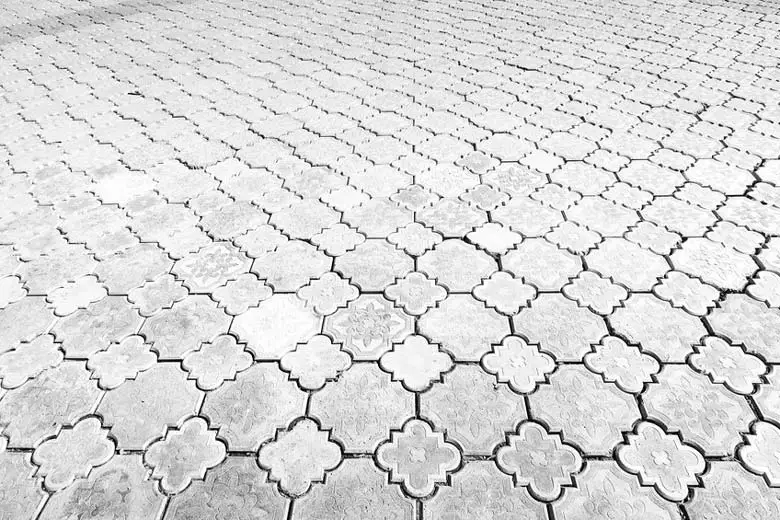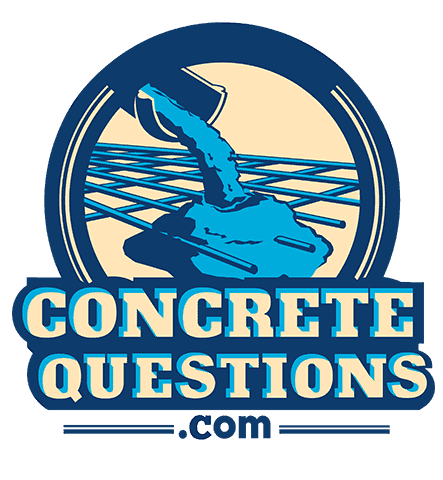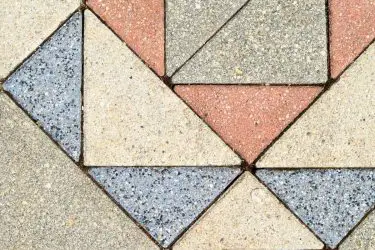Having a concrete driveway, patio, or walkway comes with several benefits—for instance, you’re assured of durable, chemically inert pavers when you use concrete. However, that doesn’t mean you won’t have to clean the surface regularly. When cleaning concrete pavers, you’ll most likely want to use the method that offers the best results.
To clean concrete pavers, you can use trisodium phosphate, pressure washers, cat litter, baking soda, cola, vinegar, lemon juice, chlorine bleach, and chemical strippers. However, each of the methods’ effectiveness depends on the type of stain to be removed.
This article will explain the most common types of stains on concrete pavers and the best methods for cleaning them. Read on for these and more insights into how you can keep your driveway in tip-top shape.
There are several effective ways of cleaning concrete pavers. These methods mostly work best on specific types of stains. Here are ten methods you can use to remove different types of stains from your concrete pavers:

Table of Contents
How to Clean Concrete Pavers
Using a pressure washer is another effective method of cleaning a concrete paver. It’s also versatile since you can use it to clean different types of stains.
To use a pressure washer:
- You should first pre-clean the surface by removing any loose materials, dirt, or stone.
- Cover any walls or doors that the affected area touches with a tarp, cardboard, or painter’s tape to protect them from flying debris.
- Check the affected area’s slope to determine the direction the water will flow and create a dam to manage the drainage. It’s best if the water flows into your lawn; draining it into a storm drain could introduce chemicals into your water supply.
Once you’ve cleared out the paver and figured out the drainage, follow these steps to remove oil and grease stains:
- Apply a degreaser to the stain and allow it to sit on for a few hours, then reapply. For older, tougher stains, use an undiluted degreaser. Ensure you follow the dilution instructions for better results. Using a wire brush, scrub the degreaser into the stain.
- Set up the pressure washer. You can use the high-pressure nozzle on tougher stains.
- Apply the detergent, depending on the instructions that come with the pressure washer. Only use a detergent made for use with a pressure washer. Point the low-pressure nozzle downward and move back and forth as you apply the detergent to the driveway, starting from the higher end and moving in the direction the water flows. Let the detergent settle in for about 15 minutes.
- Use the high-pressure nozzle to rinse the driveway. Ensure you’ve set the washer to rinse mode when doing that. Move from the higher to the lower end of your paver.

If you prefer the pressure washer method, you could try this popular Sun Joe SPX3000 Electric High Pressure Washer from Amazon.
Don’t forget to wear shoes and long pants when using a pressure washer!
Tips: Don’t allow the detergent to dry before rinsing it. Avoid adding bleach as well since it may damage the washer. Ensure you rinse away all of the detergent residues and pay more attention to the areas with tougher stains—they may require higher pressure.
How to Clean up Oil Spills From Concrete Pavers
Trisodium phosphate (TSP) has a degreaser effect, making it the best chemical for eliminating oil spills and similar stains from your driveway, patio, or walkway. This cleaner breaks down most oils and solvents and works well for heavy-duty cleaning.

We recommend this Sunnyside TSP All-Purpose Heavy Duty Cleaner from Amazon. It’s effective for heavy-duty cleaning, odorless, and provides dust-free cleaning, especially when used on painted surfaces.
To use this cleaner:
- Add a cup of TSP to each gallon of hot water.
- Saturate the concrete with the solution. A garden sprayer comes in handy when doing this.
- Let the solution sit for 15-20 minutes, and then scrub it with a stiff brush.
- Rinse the concrete by hosing off the solution.
For tougher stains, you can use a thick paste of TSP and diatomaceous earth or cornstarch. Apply the paste over the concrete and let it dry. Then, scrape the paste using a putty knife and hose off the area.
Caution: TSP causes severe skin burns and eye damage. Always wear protective gear when using it for cleaning.
How to Remove Oil Stains From Concrete With Baking Soda, & Dish Soap
Cat litter, baking soda, and dish soap are effective at removing stubborn oil stains. You can use them to clean concrete surfaces by following these steps:
- Absorb the excess oil. Sprinkle cat litter over fresh stains. It has ultra-absorbent properties, making it ideal for cleaning oil stains. Let it absorb the oil, then scoop and dispose of it. Rinse any residue with water.
- Scrub the stain. Once the excess oil has been absorbed, scrub the stain using a paste of baking soda and water. The baking soda helps to dissolve dirt and grease. Rinse the surface using clean water.
- Lather and rinse. You could also use dish soap to dissolve oil and grease stains from the surface. Squirt some soap onto the stain, then scrub it with a hard brush. Rinse the soap away with water. Repeat this process if necessary.
How to Clean Concrete Pavers With White Vinegar & Lemon Juice
Vinegar and lemon juice are natural, safe alternatives to consider when cleaning concrete paved surfaces. These two ingredients are effective for dissolving rust stains on concrete surfaces.
For tougher rust stains, you can mix white vinegar and lemon juice on a 1:1 ratio. For the best results, don’t dilute the solution.
To use this method, you’ll need:
- Lemon juice or white vinegar
- Water
- Hard-bristle brush
Follow these steps to remove rust from your concrete driveway:
- Pour the lemon juice and white vinegar mixture directly onto the stain. Use a 1:1 ratio if you’re combining both.
- Let the solution sit for 10-20 minutes. After that, vigorously scrub the stain using the brush.
- Using clean, cold water, rinse the area. Repeat these steps until the stains fade away.
How to Remove Paint Stains From Concrete Pavers
A chemical paint stripper is an effective method for tackling paint stains on concrete. Before you attempt this method, make sure you have eye protection, a respirator, or a dust mask. The latter is only suitable for open, well-ventilated areas.
Follow these steps:
- Mix the paint stripper with an absorbent, such as finely ground kitty litter, diatomaceous earth, or baby powder until you get a thick paste.
- Using a brush or thick sponge, apply the paste over the paint spill and allow it to settle for 20 minutes.
- Using a plastic paint scraper, remove the mixture of paste and loosened paint.
- Use a plastic paint scraper to remove the paste and loosened paint.
- Sprinkle scouring powder over remaining stains and scrub them using a nylon brush and water.
- Hose off the residue.

If you choose this method, we recommend that you use this Dumond SmartStrip Paint Remover from Amazon. It’s biodegradable, removes all layers of paint, odorless, and non-toxic.
Note: If you notice a bit of stain left, spread the stripping paste again and let it dwell for 30 minutes before scrubbing and rinsing.
How to Remove Pet Stains & Odors From Concrete Pavers
Your four-legged friends may sometimes relieve themselves on your patio, driveway, or walkway, leaving behind smelly and repulsive stains.
If you’re dealing with pet stains, you can follow these steps to clean the mess and remove the stains:
- Using a poop scooper, scrape off the dried droppings.
- Prepare a cleaning solution of 1/8 cup liquid dishwashing detergent, a gallon (3.78 liters) of water, and ½ cup baking soda.
- Pour the thoroughly mixed solution over the stained area.
- Using a nylon scrub brush, work the solution into the stain and scrub until the marks are gone.
- Rinse thoroughly and let the concrete dry.
- To eliminate any lingering odor, spray an enzyme pet stain cleaner, such as this non-toxic, versatile, and highly effective Rocco & Roxie Professional Strength Stain & Odor Eliminator from Amazon.
- Keep the concrete wet for at least one hour, then rinse with water.
How to Clean Concrete Pavers With Chlorine Bleach
Chlorine bleach isn’t just effective on dirty laundry; you can use it to keep your concrete pavers in tip-top shape all year round.
To use this method:
- Mix chlorine bleach and water in a 1:1 ratio.
- Using a garden sprayer, spray the mixture onto the driveway and let it settle for 10 minutes.
- Scrub the stains off with a stiff brush, then rinse the surface with your garden hose.
Caution: Bleach is harsh on the skin; ensure you wear rubber gloves and goggles when using it. Cover your arms and legs as well during the process.
Remove Mildew Stains With Chlorine Bleach & Laundry Detergent
This mixture is best suited for removing mildew stains from your concrete paver. Besides being an eyesore, mildew is a health hazard—it can cause respiratory problems, wheezing, coughing, and a sore throat. It’s also slippery and can make your driveway potentially dangerous to walk on.
Mildew grows when the plants covering areas of concrete trap in moisture. To keep it at bay, ensure your plants are pruned and away from the driveway. Sunshine and ventilation often do the trick when it comes to preventing mildew, but what happens if it’s thriving on your driveway?
The trick is to use a mildewcide, a cleaning solution you can make using chlorine bleach and powdered laundry detergent. If you’re an enthusiastic DIYer, here are the steps:
- Mix chlorine bleach and water in a 1:3 ratio.
- Add 1/3 cup of the laundry detergent to the solution.
- Apply the solution to the mildew stains and wait until the stains turn white.
- Rinse off the white residue before it dries up.
How to Remove Tire Marks From Concrete Pavers
Depending on the type of sealer on your concrete driveway, you may notice some discoloration. This occurs when hot tires come into contact with the sealer, and plasticizers migrate into the latter.
To get rid of the stains, scrub it using a degreaser and a stiff brush. However, if the discoloration has sunk deep beneath the sealer, you may need to use a chemical stripper or apply a solvent.
Tip: To prevent tire marks, use acrylic or polyurethane sealer. These sealers form dense films on concrete surfaces, minimizing plasticizer migration.
How to Clean Concrete Pavers With Coca Cola
Coke cleaner is clear proof that you don’t need to break the bank to spruce up your concrete surfaces. Coke is an effective, affordable cleaner and stain remover.
Cleaning oil stains using this product is easy and quick; you need to follow these steps:
- Pour two cans of Coke onto the stained area. Let it sit for a day.
- Wash the Coke cleaner offer with a hose. If the stain persists, pour a few more cans over the stain and wait another 24 hours.
Most Common Stains on Concrete Pavers
When concrete is exposed to the elements, cars, and human traffic, it’s more likely to develop stains. For that reason alone, you’ll need to watch out for the most common stains, which include:
Rust Spots
Rust pop-outs are common on concrete pavers, especially in areas with high iron or coal soil content. They look like rusted metal popping out of the paver.
Rusting occurs when iron, oxygen, and water react. Generally, coal and iron are considered soft rocks because they absorb more water than other stone types. When these rocks absorb a lot of water, the concrete pops above the stone. Once exposed, it reacts with water and air, causing unsightly brown spots.
Nonetheless, coal and iron don’t impair the surface’s usability if cleaned with a calcium, lime, and rust remover. You can also seal your driveway, walkway, or patio to reduce the chances of the soft rock causing pop-out. If rusting occurs after that, you can clean the affected area and reseal it.
In some instances, the iron and coal content in concrete is higher than that of the soil. In that case, you may need to remove the stones with pop-outs and patch the affected areas.
Related article: Rust Stains on Concrete: Causes, prevention, and repair info
Fertilizer Stains
Plants and flowers add that aesthetic appeal to our indoor and outdoor spaces. Depending on the type of plants you use to line your driveway pavers, you may require some fertilizers to replenish their nutrients and promote growth.
However, by doing that, you introduce the minerals in fertilizers, such as zinc, copper, iron, and magnesium, onto your concrete pavers. These minerals can react with water on the concrete surface, causing rust-like stains.
Unfortunately, most minerals in fertilizers and plant foods are insoluble in water, making it hard to remove their stains using just water. You may need to buy special detergents to remove these stains completely.
Tip: Always read the manufacturer’s guidelines when using any detergent that promises to clean fertilizer stains from concrete. Some detergents have chemicals that may degrade concrete, cause spalling or deterioration. Avoid preparing fertilizer solutions on any concrete surfaces as well.
Oil Stains
Perhaps you’ve had some oil stains on your driveway in the past. Either your car leaked oil at some point, or you had a spill while changing your oil. Whatever the case, the outcome was likely the dreaded black spot on your driveway.
An oil spill on the driveway can leave an unsightly stain that can become an eyesore if you don’t remove it immediately.
Because concrete is porous, any fluid that hits its surface slowly penetrates its layers, leaving behind a stubborn stain. However, you can prevent that by cleaning the surface with an absorbent immediately after the leak happens.
Read our article on how you can remove oil stains from your concrete driveway for more information.
Potted Plants Stains
Any potted plant on your driveway or walkway is another sure-fire way of staining the concrete. When you leave a potted plant in the same spot for some time, water builds up underneath the pot, creating a ring-shaped stain around the pot’s rim.
Gentle scrubbing using a dish detergent and warm water often does the trick. For tougher stains, you may need to use oxygenated bleach and water. Apply a 1:1 ratio of the mixture onto the concrete, let it settle for about ten minutes, and then scrub the stains away.
Salt Stains
De-icing salts often come in handy during cold weather. You’ve probably poured some salt on your driveway or patio to break down some of the ice. However, the salt can also stain your concrete and stick around all year.
To rid your driveway of these stains, mix together some vinegar, dish soap, and water. Cover the stained area with the solution and let it settle for about 15 minutes. After that, scrub away the markings using a stiff-bristled brush.
Concrete Paver Maintenance Tips
Besides regular cleaning, here are some ways to keep your concrete pavers clean, beautiful to look at, and durable:
- Reseal your pavers as necessary. Reapply a sealer every few years to restore your paver’s appearance while extending its lifespan. Let the concrete dry before resealing to avoid trapping moisture.
- Act fast. Procrastination can be harmful! Remove leaves, oil spills, paint, pet stains, and other contaminants from your concrete pavers as soon as you notice them. If you wait, the concrete will absorb the stains, making cleaning much harder.
- Avoid using de-icing chemicals. They can cause scaling and thawing and make sealers less effective. Sand is a less harmful alternative for de-icing.
- Re-sand the joints. Refill any sand that washes away from the joints between pavers. You can use polymer sand since they bind better, preventing erosion.
Conclusion
There are several methods of tackling different kinds of stains that you’ll come across on your concrete pavers. Whichever method you use, ensure you follow these tips:
- Avoid using wire brushes on concrete since they scrape it.
- Ensure oil and chemical stains don’t drain into sensitive areas, such as storm drains.
- When using new chemicals, spot test them first to avoid causing massive damage to your concrete pavers.
- Always put on protective clothing, gloves, and eyewear when using harsh chemicals.
- Before using any chemical cleaner, ensure you read the manufacturer’s guidelines.



